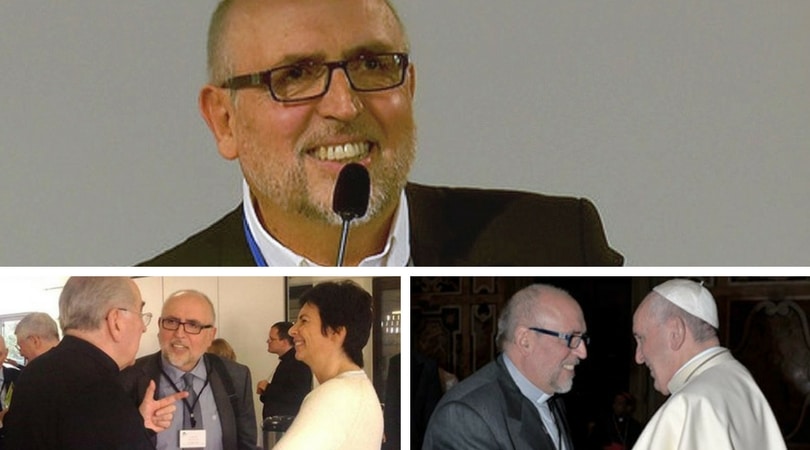
The task of a creative minority
Here are excerpts from a speech by Jesús Morán Cepedano, co-president of the Focolare Movement, philosopher, specialized in theological anthropology, on the occasion of the Congress Together for Europe in Munich, June 30, 2016.
Why has Europe given rise in the last few centuries to a culture which has made God less of a mystery than an irresolvable problem? And, as a consequence, has made human beings into an inextricable problem in relation to themselves, to others, to creation and to the Absolute? This question is all the more “scandalous” if we think of the history of the European continent, which over many centuries developed a strong and original humanism in spiritual, artistic, philosophical, scientific, legal and political spheres.
In 2004, the then cardinal J. Ratzinger wondered if it was not true, as Arnold J. Toynbee states, that the destiny of societies largely depends on their creative minorities. Perhaps – he affirmed – this is the task that belongs to Christians: to conceive of themselves as the creative minority that leads Europe to rediscover its heritage.
We are reminded of the nature of this heritage in a masterly and surprising way also by intellectuals of the calibre of H G Gadamer and G Steiner, who while looking from very different contexts, perspectives and experiences, both see in Europe a task that is “as much spiritual as it is intellectual”. For Gadamer: ”To live with the other, to live as the other person’s other, is a universal task which is valid in the small and larger scales. Just as we grow and enter into life learn to live together with others, the same thing applies to larger groupings in humanity, to peoples and States’. It is probably a European privilege the fact of having had to and been able to learn to live with diversity.” (L’eredità dell’Europa, Einaudi, Torino 1991, pp.21-22)
This destiny calls for the creativity, ingenuity and capacity to get up again and go beyond its own limits that have always been part of the European soul, as has been shown by its entire history and above all after the Second World War. The founding Fathers of the European Project were able to grasp the moment and were bold enough not only to dream of another idea of Europe but to start making it happen by focusing on the integration of the entire heritage of the continent, being well aware, according to the prophetic words of Konrad Adenauer that: “The future of the West is not threatened as much by political tensions as by the danger of conformism, uniformity of thoughts and feelings; in a word, by the whole system of life, by flight from responsibility, with concern only for oneself.”[1]
It follows that the perspective that Europe can and must still, and more than ever, give to the world is that of forming a culture of unity in diversity at all levels, from the personal and daily levels to the institutional and forward-looking, as has been said recently by Patriarch Bartholomew, the Ecumenical Patriarch: “Even human institutions – if we are able to “transfigure them” with this focus on diversity – will understand that diversity is a gift and not a contradiction; it is wealth and not imbalance; it is life and not death. We live in a context in which pluralism risks being sacrificed in the name of a false unity, which wants the global levelling down of all expressions of human life. … Instead, with the acceptance of diversity as the foundation of the unity of a wounded humanity, through dialogue of love, through mutual respect, through acceptance of the “other” and our willingness to welcome and be welcomed, we can become for the world, icons of Christ and, like him, be in unity also in diversity.[2]
It is a question, therefore, of returning with new drive and urgency to evolve a culture of human rights which can wisely connect the personal dimension and that of the common good of all intermediate groups which unite in a social and political community. At the same time this should be done without losing sight of the transcendental dignity of every human being, as Pope Francis affirmed strongly in his 2014 talk to the European Parliament.
In following this path, the role of ecclesial communities is seen once again to be crucial and decisive because their task is precisely that of their mission, the joyful proclamation of the good news. We are at a time in which Christianity is being ex-culturated and the “cultural pact” between the Churches and society has been broken. In other words, it seems that the Christian cultural basis which formed the West has disappeared, through the emphasis on the principle of an autonomous society and its “exit from religion”. It is a question now of returning to the Gospel, to bring about significant encounters in the light of Scripture, the Gospel stories, so as to generate, indeed, the same life as Jesus generated. As Pope Francis emphasised just a few weeks ago, on the occasion of the conferral of the Charlemagne Prize: God desires to dwell in our midst, but he can only do so through men and women who, like the great evangelizers of this continent, have been touched by him and live for the Gospel, seeking nothing else. Only a Church rich in witnesses will be able to bring back the pure water of the Gospel to the roots of Europe. In this enterprise, the path of Christians towards full unity is a great sign of the times and a response to the Lord’s prayer “that they may all be one” (Jn 17:21).[3]
[1] Address to the Assembly of German Artisans, Düsseldorf, 27 April 1952. Quoted by Pope Francis’ in his address on the occasion of the Conferral of the Charlemagne Prize (6 May 2016).
[2] Lectio magistralis by Ecumenical Patriarch Bartholomew on the occasion of the Conferral of the Honorary Doctorate by the Sophia University Institute, Loppiano 26 October 2015.
[3] Pope Francis, Address on the occasion of the Conferral of the Charlemagne Prize, Rome, 6 May 2016.
Photo: ©Ursel Haaf – www.urselhaaf.de

